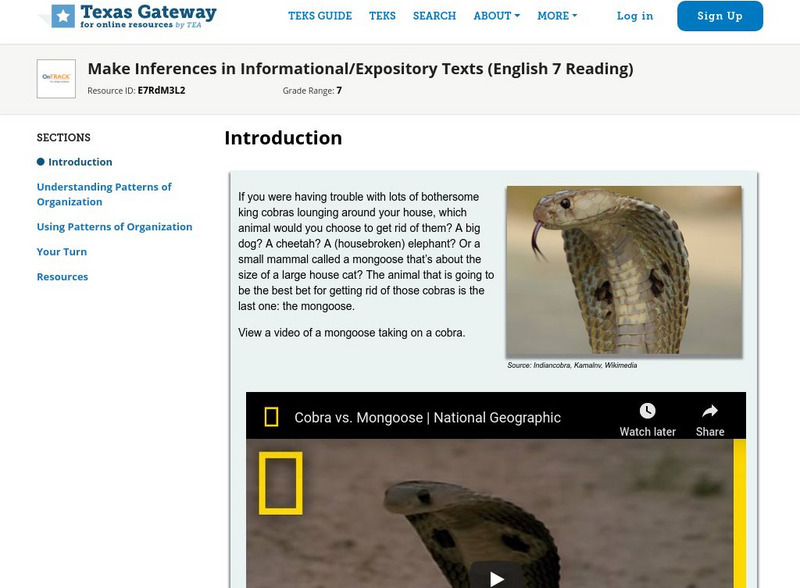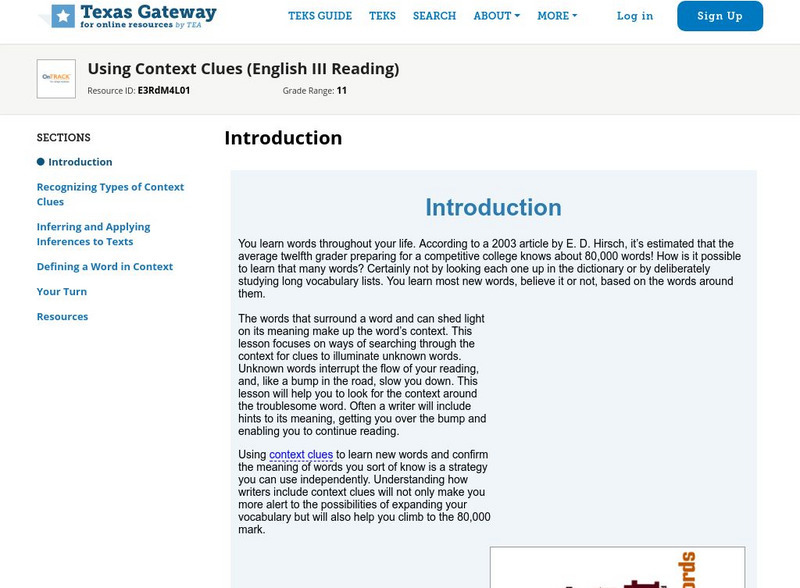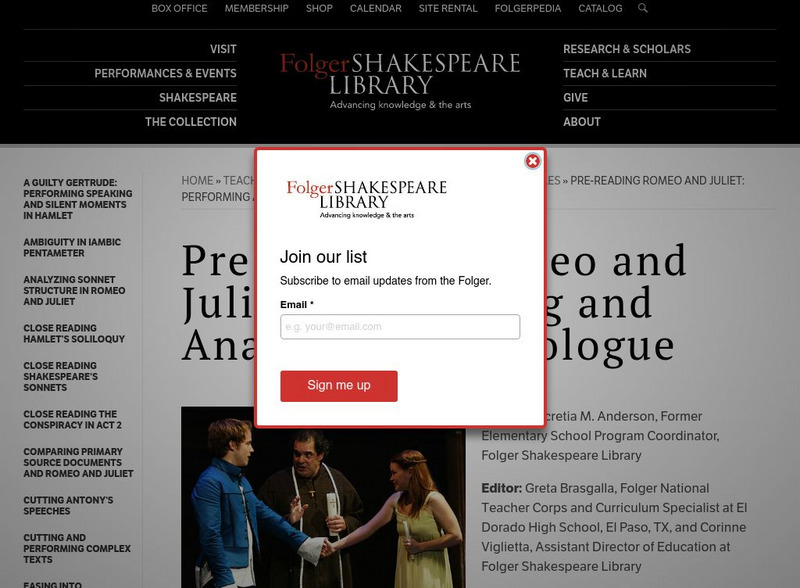William & Mary
Inferential Reading Comprehension Considerations Packet
Don't forget to read between the lines! Educators learn tips and activities to help scholars learn to infer to increase reading comprehension. Activities suggested include think alouds, backwards words, and who's who. the packet includes...
EngageNY
TASC Transition Curriculum: Workshop 6
Is a college education necessary for success in today's world? The class investigates the question, along with others at the end of the sixth workshop in a 15-part series. The instructional activity has four parts with multiple...
New York State Education Department
TASC Transition Curriculum: Workshop 10
How have educational standards evolved? Educators of adults examine expectations in the 10th workshop out of 15 to better determine how standards have grown. Participants respond to a variety of sample questions to determine how they...
New York State Education Department
TASC Transition Curriculum: Workshop 5
Are video games sports? Pupils investigate this question as well as various nonfiction selections to learn more about claims and the support that defines them. All of the selections mimic the rigor on state tests and encourage close...
Other
Peoples Education: Make Inferences in Science [Pdf]
This online textbook selection focuses on how scientists make inferences from evidence. Students are given a reading passage about underwater exploration and are asked to make inferences based on the text. The passage is followed by...
Austin Independent School District
Austin Independent School: 10 Major Types of Inference in Literature [Pdf]
This printable worksheet helps students recognize the difference between an implication and an inference. Students are presented with quotes from the text and they practice with each of the ten types of inference: location, agent, time,...
Reading Rockets
Reading Rockets: 103 Things to Do Before/during/after Reading
The highly-respected Reading Rockets program offers both teachers and students a toolkit of ways to connect more actively with the materials they read. Some of these techniques are specifically for fiction-reading, others are designed...
E Reading Worksheets
E Reading Worksheets: Making Predictions Worksheets and Lessons
In this learning module, students will learn more about making predictions in reading. Worksheets and a leson are provided to support Tier I, Tier II, and Tier III students.
Read Works
Read Works: Growing Up in Darfur: Sudanese Children Struggle to Survive
[Free Registration/Login Required] An informational text about a girl named Sumaya and her life in a refugee camp in Darfur. A question sheet is available to help students build skills in reading comprehension.
Sophia Learning
Sophia: Critical Reading as a Learning Strategy
This tutorial focuses on critical reading using a downloadable PowerPoint presentation, "Critical Reading 101," which includes separating fact from opinion, 6 propaganda techniques, and 6 common fallacies in reasoning. Also provided is...
CommonLit
Common Lit: Women in Ancient Rome
CommonLit.org is a wonderful resource to use in a Language Arts classroom. Each story or article is accompanied by guided reading questions, assessment questions, and discussion questions. In addition, students can click on words to see...
E Reading Worksheets
E Reading Worksheets: Fact and Opinion Worksheets
Fact and opinion practice exercises, answer sheets, and explanation summaries are included on this tutorial site. Worksheets are tiered in levels of difficulty.
Texas Education Agency
Texas Gateway: Make Inferences in Informational/expository Texts
[Accessible by TX Educators. Free Registration/Login Required] Use different organizational patterns as guides for summarizing and forming an overview of different kinds of expository text while distinguishing factual claims from...
Reading Rockets
Reading Rockets: Building Background Knowledge
The importance of background knowledge is especially salient in the age of Common Core. This article offers practical classroom strategies to build background knowledge such as using contrasts and comparisons and encouraging...
Texas Education Agency
Texas Gateway: Using Context Clues (English Iii Reading)
[Accessible by TX Educators. Free Registration/Login Required] This lesson focuses on ways of searching through the context for clues to illuminate unknown words. Unknown words interrupt the flow of your reading, and, like a bump in the...
Texas Education Agency
Texas Gateway: Themes in Literary Texts (English 6 Reading)
Learn how to infer the implicit theme in a work of fiction, distinguish theme from topic, and make complex inferences using textual evidence.
Folger Shakespeare Library
Folger Shakespeare Library: Pre Reading Romeo and Juliet
This site shares a two-day instructional activity that will help learners prepare for reading Romeo and Juliet. Students will read and perform the prologue of Romeo and Juliet and engage in the analysis of the play's meaning, get to know...
E Reading Worksheets
E Reading Worksheets: Inferences Worksheets
In this learning module, students will learn more about making inferences. Worksheets are provided to reinforce the skill of making inferences. This module is designed to support Tier I, Tier II, and Tier III students.
AdLit
Ad lit.org: Classroom Strategies: Inferential Reading
Teaching students to "read influentially" helps them learn how to read more strategically. This technique is derived from the teaching model that learners develop knowledge via the process of interpreting new information in light of past...
Better Lesson
Better Lesson: Introduction to Making Predictions and Inferences
First graders will engage in a shared reading of "Mr. C's Dinner" so that we can build a foundation for understanding what it takes to make good predictions and inferences.
Khan Academy
Khan Academy: Inferences About Information Quick Guide
Some questions in the Reading Comprehension section will ask you to make an inference about information in the passage. The answer may not be explicitly stated in the passage, but it will be supported by the content of the passage. In...
Better Lesson
Better Lesson: Using Word and Picture Clues to Make an Inference
First graders will use text evidence to make inferences about word and word phrase meanings in a text. Word and picture clues will be used to help students form inferences.
TES Global
Tes: Coraline 5 Reading Assessment
[Free Registration/Login Required] This lesson plan provides a way to assess students' understanding of inferences about the traits of characters in the Neil Gaiman's novel Coraline.
E Reading Worksheets
E Reading Worksheets: Implicit Character Traits Worksheet
In this learning module, students will practice making inferences about character traits. A worksheet is provided to practice with finding implicit character traits. This module is designed to support Tier I, Tier II, and Tier III students.
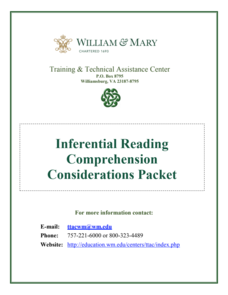
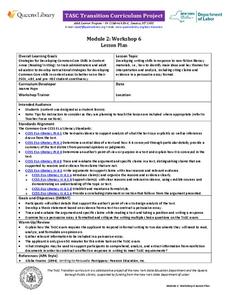


![Peoples Education: Make Inferences in Science [Pdf] eBook Peoples Education: Make Inferences in Science [Pdf] eBook](https://d15y2dacu3jp90.cloudfront.net/images/attachment_defaults/resource/large/FPO-knovation.png)



